Latest News Archive
Please select Category, Year, and then Month to display items
02 January 2025
|
Story Gerda-Marie van Rooyen
|
Photo Supplied
 Leading the research in South Africa is Prof Linus Franke from the Department of Soil, Crop and Climate Sciences.
Leading the research in South Africa is Prof Linus Franke from the Department of Soil, Crop and Climate Sciences.
Scientists are actively pursuing the successful breeding of diploid hybrid potatoes from inbred lines. This is expected to revolutionise potato breeding as it holds the key to rapid genetic progress. It will introduce new varieties for commercialisation through seed. Currently, existing potato variants have a gene that renders self-pollinated seeds infertile.
Prof Linus Franke, an academic in the Department of Soil, Crop and Climate Sciences at the UFS, is leading the research in South Africa. “This technology allows the production of genetically uniform potato seed that is easy to transport and largely disease-free.” He says this differs from conventional breeding whereby only vegetative propagation is possible due to tetraploid varieties in potatoes. It also risks carrying pests and diseases from one generation to the next – leading to the accumulation of pests and diseases with each round of multiplication.
Seed innovation
Prof Franke explains that Solynta BV, a seed company based in the Netherlands that produces potato varieties that can be grown from seed, has included South Africa in their research efforts because it is one of Africa’s largest producers and exporters. Through his academic relationship with Wageningen University and Research, a Dutch institution renowned for its agricultural endeavours and food production, the UFS became involved in researching hybrid potatoes grown from seed.
Diploid seeds containing two sets of chromosomes allow easier gene manipulation to increase predictability and speedier genetic progress. The breeding approach enables the incorporation of tolerance to pests, diseases, abiotic stresses (cold, heat, drought) and other desired genetic traits.
Although Prof Franke is optimistic about this research, he is not blind to disadvantages. “Potato seeds are tiny and have little energy reserves, making it harder to grow potatoes from seed than from tubers.” He says potatoes from seed will take longer to cultivate than tubers, as farmers need to grow plantlets from seeds first, adding six weeks to the growing period. “It is possible that commercial farmers can grow potatoes directly from seed. Alternatively, perhaps more likely, specialised growers will produce tubers of potatoes from seed; these tubers are then sold as seed tubers to other potato farmers, who then continue their normal practices of producing potatoes for the market from tubers.”
Financial benefits
Prof Franke says farmers have reason to get excited. “Seed potatoes will reduce input costs, as varieties with enhanced tolerance to pests and diseases require less pesticides. Planting one hectare of potatoes requires three to four tonnes of potato tubers, but only one 25 g packet of potato seeds.” Since potatoes are a more valuable commodity than maize, this technology might also increase farmers’ income potential.
Kovsie athletes set the world alight
2009-08-05
|
Kovsie athletes Johan Cronjé, Thuso Mpuang and Kagisho Kumbane recently left for Berlin to participate in the World Senior Athletics Championships that will take place from 15-23 August 2009. It is an extraordinary achievement for the University of the Free State (UFS) that three of its athletes were included in the South African senior group that will participate in the world athletics championships in Berlin.
Johan will participate in the 1 500 m. Thuso, who earlier this year won a bronze medal in the 200 m at the World Student Games that were held in Belgrade, Serbia with a time of 20,69 seconds, will again participate in the 200 m at the championships in Berlin. Together with Kagisho he is also included in the South African relay team that will participate in the 4 x 100 m relay at these championships. Both Thuso and Kagisho were included in the South African team that ended third in the 4 x 100 m relay in Belgrade.
Kagisho also participated in the World Student Games in Belgrade, Serbia and progressed to the third round in the 100 m. Boy Soke, also a Kovsie athlete, ended in ninth place in the 5 000 m finals in Belgrade.
Windy Jonas, also from Kovsies, has left for Mauritius where he will participate in the Africa Junior Championships that will take place from 30 July to 3 August.
|
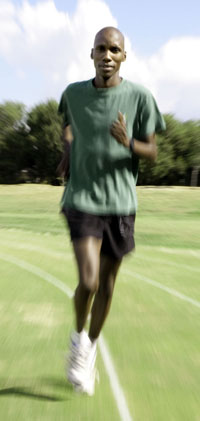 |
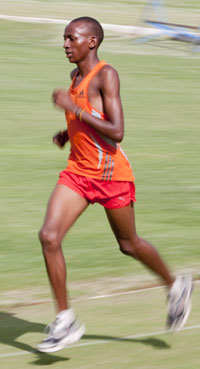 |
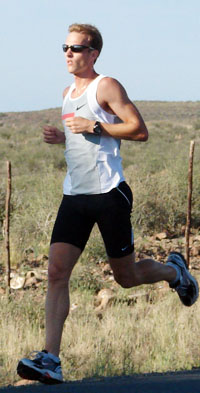 |
| Boy Soke |
Windy Jonas |
Johan Cronjé |
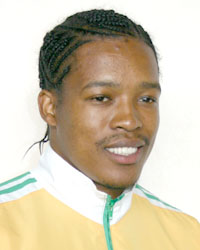 |
|
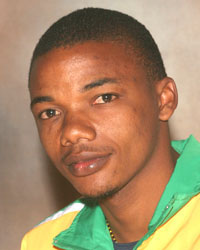 |
| Thuso Mpuang |
|
Kagisho Kumbane |
|